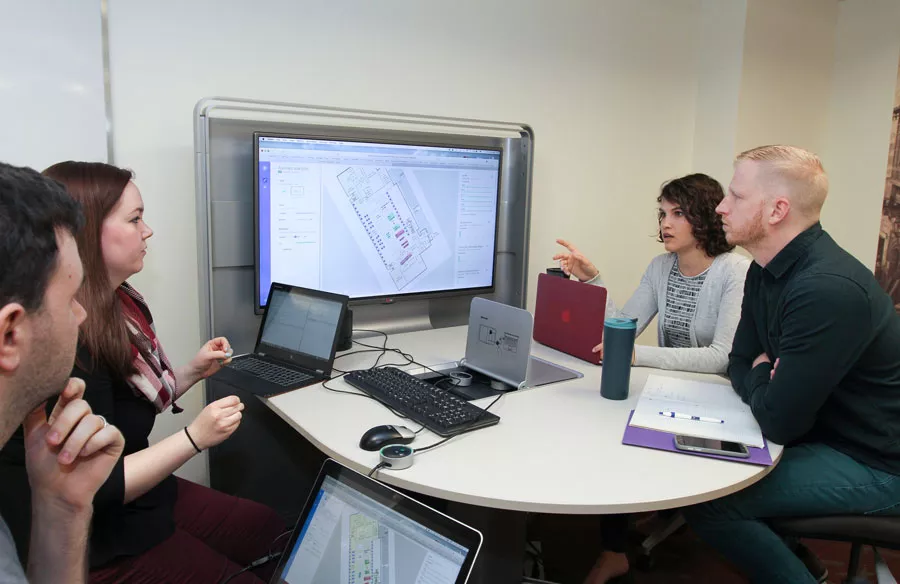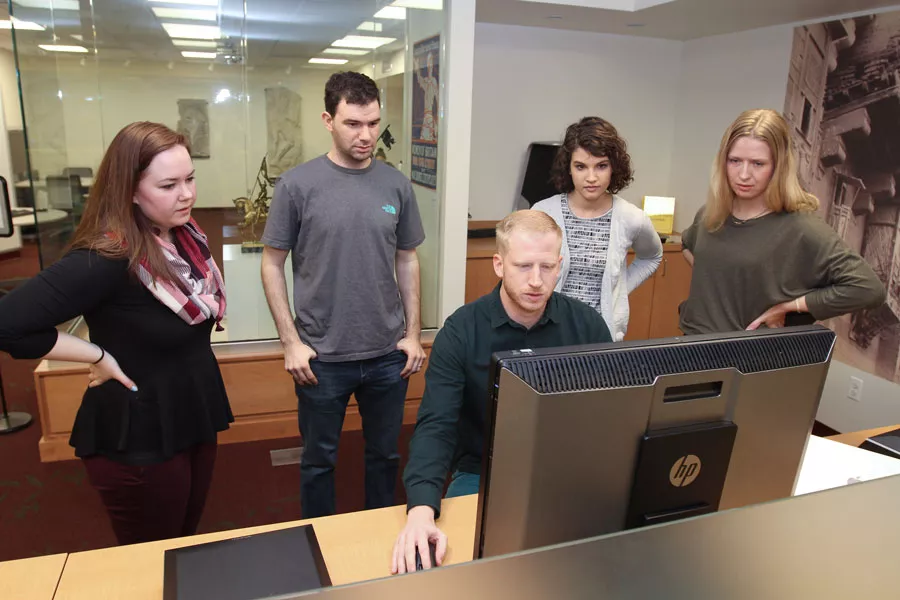
Every Thursday, five graduate students huddle in front of one of the large computers in the Digital Media Lab in Carpenter Library to hash out ideas about how to simplify or expand the research of their peers. Their meetings are focused and intensive, but lively and enthusiastic. Their work is part of the College’s new Digital Scholarship (DS) initiative aimed at facilitating digital research methods in the humanities around campus.
Digital scholarship is a relatively new field which looks to digital technologies to help ask and answers research questions in new ways. Examples range from online exhibitions to 3-d mapping and from illustration software to data management programs—tools that are increasingly a fact of life for today’s scholars.
But because of all that is available in the rapidly expanding field, it can be difficult for scholars to keep up. Enter the DS graduate assistants, whose primary goal is to learn about the range of tools available and what are the benefits of each for academic research. They plan to take what they are learning and share it back with their peers in the Graduate Group in Archaeology, Classics and History of Art.
The DS graduate assistant meetings exude positivity and a genuine interest in community enrichment.
Each assistant brings a different set of skills to the group. Some members were programming minors in their undergraduate years, others have prior experience in graphic design and web development. Each DS graduate assistant has been selected from the Graduate Group’s three disciplines: Stella Fritzell from Classics; Elena Gittleman and Nathanael Roesch from History of Art; and Rachel Starry and Andrew Tharler from Archaeology. This interdisciplinarity is useful for understanding the scope of digital methodologies available.
Some aspects of digital scholarship are already familiar to Bryn Mawr students. Online digital exhibition platforms such as Omeka and WordPress have recently been introduced into the History of Art curriculum. These virtual exhibitions help re-frame how students think about works of art, bringing together objects in ways that might otherwise not be possible. But these platforms often require a technical assistant to direct students on how to use the tools effectively. This is one of the goals of DS assistant Elena Gittleman, who brings experience with both tools to the group and has been working with faculty and students to create online art exhibitions in class projects.
Nathanael Roesch is also thinking about exhibitions and specifically how the 3-d modeling software SketchUp might be used to help curators in planning a physical art exhibition. He is currently measuring and mapping the Rare Books Room in Canaday Library, the College’s main exhibition space, in order to help students troubleshoot different gallery configurations during the planning stages of local exhibition projects.
In addition to data visualization resources, the group also plans to educate the community on the basics of data management. Rachel Starry, who has a background in computer science, has been using the programming language R to organize and visualize data from her dissertation research. And she has recently hosted several seminars on the language for those interested in statistical analysis, computer graphics, and mapping.
Another area of growing interest involves the use of bibliographic management tools, which is Andrew Tharler’s contribution to the group. Already this term he has given tutorials in classrooms on Zotero, a powerful tool that allows researchers to archive and organize their resources, store notes, and automatically generate citations and references when writing papers.
There are also plans underway to reach out to the undergraduate community. This summer, the Digital Scholarship program is offering a selective, intensive summer fellowship program for Bryn Mawr undergraduates. Organized by Stella Fritzell and Bryn Mawr's Digital Scholarship Specialist Alicia Peaker, the program is a professional development workshop that will train students in a range of digital scholarship methodologies. These undergraduate specialists will then be able to share what they've learned with other students over the course of the following academic year.
While the DS graduate group is still very much in a nascent stage, it has been evolving exponentially at each meeting. Because of the recent arrival of the discipline, one of the main challenges for the DS graduate assistants is simply raising awareness about the benefits of digital scholarship to the Bryn Mawr community. As part of their outreach efforts, the DS graduates have also conducted a survey of their peers to get a sense of what digital tools they are already familiar with and what methods they are most interested in learning about in more detail. The group is using these results to put together programming for the next academic year, when it hopes to continue its efforts advocating on behalf of Digital Scholarship at Bryn Mawr.
